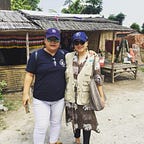Standstill Dhaka: Life and food tips from a megacity in lockdown
WFP staff share a few of their favourite culinary pick-me-ups to brighten up the days of Coronavirus restrictions
It is an unusual day in Dhaka. The capital of Bangladesh, one of the world’s most densely populated countries, is usually teeming with life. Its infamous traffic, the crowded bazaars of Old Dhaka, and street food vendors are nowhere to be seen. Nor are the millions of garments workers heading to work every morning — the thousands of factories producing clothes for the biggest fashion brands in the world are silent.
The megacity is at a standstill, with roads deserted and businesses closed. On 25 March, the Government declared general holidays from 26 March to 4 April, ordering most of Bangladesh’s population of 165 million to stay at home, to practice social distancing, aiming to prevent the transmission of the deadly coronavirus that has the world in its grip.
“This is a global crisis touching literally every corner of our planet and I’m sure many of you are worried about your own health and safety as well as those of family members in Bangladesh and abroad,” says Richard Ragan, WFP Representative and Country Director in Bangladesh.
While some staff are working from satellite offices, most are working remotely, from their homes, to give continuity to the work we do, which is providing food to the most vulnerable.
We are what we eat — WFP staff share recipes
While no specific food can prevent this disease, eating a healthy diet which can support the good functioning of the immune system and protect your body against illness.
Here are some snippets of how WFP Bangladesh staff are enjoying local foods to boost their immune systems and keep themselves strong.
Hafiza Khan: Sweet Potatoes and Shrimp Curry
Hafiza Khan who works as Field Coordinator for WFP operations in Bangladesh says, “one of my favourite Bangla meals is a traditional sweet potato and shrimp curry”.
Locally grown sweet potatoes are a great source of fibre, vitamins, and minerals and it boosts the immune system. The shrimps from the Bay of Bengal are rich source of protein and omegas. This mouth-watering curry is famous in Bangladesh.
Masing Newar: super herbal drink
Massing Newar works for the Mother and Child Benefit programme. She says: “My son suffers from respiratory illness, so all of us at home have adapted to certain eating habits, especially at a time like this, where we have to be healthy.”
“Every day, I make a herbal tonic comprising lemon water, ginger, neem (a tropical tree leaf found in Bangladesh) and honey. The lemon contains a lot of vitamin C and neem has always been used in ayurvedic medicine for its antibacterial and antiviral benefit.”
Din Ara Wahid: Aloe juice
Dina, a vulnerability assessment and mapping officer, drinks a glass of fresh aloe juice every day. Aloe vera has been used for medicinal purposes in several cultures for millennia. The plant contains vitamins A (beta-carotene), C and E, which are antioxidants. “In Bangladesh, aloe vera juice is commonly known for its health benefits” says Dina. “I buy them in bulk from our local street vendor and store them. I use the fleshy extract of this plant, mix it with some lime and blend it to produce a healthy tonic”.
Mahbuba Kaniz: Lemon Water and Fruits
“My mother suffers cancer, and we are taking all the necessary steps to safeguard her from getting sick,” says Human Resources Officer Mahbuna Kaniz. “In my house, we are having a lot of fruits as well as fresh green vegetables such as spinach which is good for our health”. “We are also having lemon water every day as it balances the pH level in our bodies and is full of vitamin C.”
Feeding those most in need
Amid this crisis and even by working from home, WFP Bangladesh staff are still working around the clock to keep its operation going, which includes providing food to the most vulnerable including 855,000 refugees in Cox’s Bazar.
“Stay strong, keep each other strong, stay hydrated, don’t panic,” says Richard Ragan. “We’re all in this together and together, we’ll get through this.”
